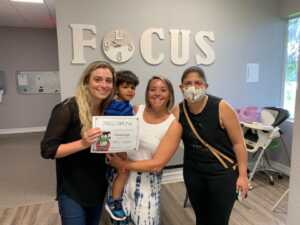Blog
Stuttering: What It Is, When to Seek Help and How Our Fort Myers Speech Therapists Treat It
Many children, when they are young and learning to talk, develop a stutter. Their brains are processing thousands of new sounds and words in the first years of their lives (aptly named a “language explosion”). As our Fort Myers speech therapists can explain, their vocabulary “explodes,” but the brain’s neural pathways are still catching up, and may have difficulty coordinating. This can be a factor in stuttering.
Sometimes, kids struggle with repetition of syllables, sounds and words. Others’ sounds are prolonged and some have so-called “blocks,” or speech interruptions. Some speculate there is a genetic component involved. No matter the specific type of stutter or the underlying reason, our Fort Myers speech therapists can help treat it.
Different Types of Stuttering
Stuttering is what’s known as a “fluency disorder.” As noted by the American Speech-Language Hearing Association (ASHA), someone who has a fluency disorder knows what they want to say, but has difficulty speaking in a way that is flowing, or fluid. They might say parts of the word or a whole word repeatedly. There might be an awkward pause between words. That’s stuttering, which is only one type of fluency disorder. There’s also “cluttering,” where one speaks rapidly and their words run together. Or they might say “um” with great frequency.
What Teletherapy Taught Me: A FOCUS Parent’s Perspective
By Rachel Revehl, FOCUS Therapy Parent
Earlier this year, prior to the pandemic, one of our son’s speech therapists from FOCUS approached me with what seemed at the time an absurd idea: Would we consider allowing him to do some of his speech therapy sessions via teletherapy? He’d be a great candidate, she said. She also thought it might help us with our busy schedule.
That last part was tempting, but…
“Um, thanks,” I replied. “But, I just don’t think that would work for him.”
Seriously, how could it? He would NEVER sit for a full session without a therapist physically in front of him, I thought.
Why FOCUS Therapy Celebrates With “Therapy Graduation” Ceremonies
FOCUS Therapy in Fort Myers is ALL about celebrating milestones big and small. We know just how hard these kids work – whether it’s speech therapy, occupational therapy, ABA therapy or physical therapy. We also know how hard their therapists and families work, too. When a child meets all the objectives of their plan of care – that is a huge success that deserves special recognition!
We’ve always held therapy graduations for kids, but we’ve been thinking more about their importance lately, not only because we’ve held several in the past few weeks, but also because we know so many kids in our community have missed important rites of passage like these in recent months. It was a real loss to them and their families. It drives home the point that whether you’re 8 or 18 or 80, a graduation is a very significant appreciation of one’s personal achievements and hard work. It’s also a gift to their family and others who have supported them along the way. When a child starts therapy, it’s often as much a journey for their family and therapy team as it is for them.
“Therapy is a commitment for the parents and the child,” explained FOCUS Therapy Owner and Founder Jennifer Voltz-Ronco. “They have to attend a certain amount of times per week, they need to show up, they need to give it their best. If it’s going to be effective, parents need to be on-board to ensure consistency and carryover. The kids work hard, the families work hard – and the therapists work so hard too! So when a child gets to the point that they’ve met all their goals and therapy is no longer necessary, I have always felt it is SO important to celebrate that victory.”
- Categorized: FOCUS News
- Tagged: FOCUS ABA therapy, FOCUS Fort Myers, FOCUS speech therapy, Focus Therapy, speech therapy Fort Myers
Back-to-School Support from FOCUS Therapy
It’s a new school year, which means a new routine – and all of us at FOCUS Therapy recognize the transition this year is especially significant because it’s the longest so many of our kids have been away from school for any one stretch. For some, this school year and all the milestones that go with it are going to continue to look much different.
School officially starts for students in the Lee County School District on Aug. 31st, with one of four instruction model options. The Fort Myers News-Press reports most will do so at half capacity. Desks will be spaced-out. Certain hallways and stairwells will be designated one-way. Classroom changes will be staggered and lunches will be served in classrooms to prevent large gatherings of students at any one place on campus. Approximately 58 percent of students are learning virtually, with 39 percent signing up for Lee Home Connect and 19 percent for Lee Virtual School.
Our dedicated team of therapists and staffers is SO excited to hear all about your first days back to school. Because this new year is going to mean many changes and everyone will be quite busy, we wanted to send out some friendly reminders to help families as they navigate through these challenges.
FOCUS Fort Myers Pediatric Physical Therapists Dedicated to Top Quality Treatment of Sports Injuries
"It's not whether you get knocked down, it's whether you get up." -Vince Lombardi, late American football coach and executive in the National Football League (NFL)
Our Fort Myers pediatric physical therapists know how important sports are to children's development, physical fitness and mental health. That's why we are committed to providing they highest quality care for children who have suffered sports injuries. We understand that while they may get knocked down, it's essential not just to their recovery but their overall well-being that they get back up - and the sooner, the better.
The U.S. Centers for Disease Control and Prevention estimates that more than 2.6 million children are treated in hospital emergency departments annually for sports and recreation-related injuries. Recently, one of those was 14-year-old Jett, a local baseball and basketball player in Fort Myers. He suffered a knee injury during one of his practices that sidelined him completely. Emergency department doctors referred him to physical therapy. But his mother, who just happens to be FOCUS Therapy's owner and founder, wasn't going to take him to just any Fort Myers pediatric physical therapists.
"I knew that a physical therapist who mostly sees adults wouldn't necessarily be attuned to the unique needs of a developing athlete," said Jennifer Voltz-Ronco. "But our physical therapists at FOCUS would."
As a speech-language pathologist, Voltz-Ronco knows a thing or two about providing therapy to kids. So when the need arose for physical therapy for her own son, she trusted the team she put in place.
Pediatric Physical Therapist Julie O'Conner virtually oversaw Jett's evaluation and first session with Physical Therapist Assistant Tabitha Baxter. Voltz-Ronco said the experience - as a patient parent rather than provider - was invaluable. She noted that it was great to see how a physical therapist could work well virtually with an assistant (and noted that not every session with physical therapist assistants must be monitored). She watched how, as a caring, professional team, they worked so well together to provide Jett with the best care.
"We treat all of our patients like family, but experiencing this not just as the owner, but also as a parent was so insightful," she said. "It made me even more confident that I hired the most knowledgeable, loving, super-amazing people."
Dr. O'Conner, who has five years of experience treating children, explained that the goal with treating pediatric sports injuries is not to get an athlete simply to the strength and endurance of their typical peers. She wants them to be at their peak level of performance.
"I want him to get to the point again that he can pivot quickly, change direction and bear as much weight as he did before the training," O'Conner said. "So that this doesn't happen again, and he can get back to playing the sports he loves."
FOCUS offers pediatric physical therapy in Fort Myers and throughout Southwest Florida. Call (239) 313.5049 or Contact Us online.
Additional Resources:
Sports Safety, Key Prevention Tips, U.S. Centers for Disease Control and Prevention
More Blog Entries:
Fort Myers Physical Therapy Tips & Tricks to Prevent & Reduce Toe-Walking, June 8, 2020, Fort Myers Pediatric Physical Therapists Blog
Speech in Spades: How We Can Use Playing Cards in Speech Therapy
The FOCUS speech therapy team is flush with great ideas when it comes to using a deck of playing cards to get your child talking.
Card-playing is a popular past time because decks are small, portable and offer endless possibilities. Our speech therapists love cards too because they can be used during sessions (or at home) as a “communication temptation” for our patients. A communication temptation is any type of motivation we use to get kids engaged, talking and practicing the various skills we’re working on in speech therapy.
In addition to classic card games for kids (think Go Fish, Gin Rummy and Crazy Eights), it’s fun to make up games directly tailored to the skills of the children with whom we’re working. Here, we’ll outline some examples. Feel free to try them out yourself or make up your own!
New FOCUS Drop-Off & Pick-Up Policy Due to COVID-19 Concern
Attention FOCUS Families: Effective immediately and until further notice, the FOCUS Therapy waiting room will be closed.
We are updating our pickup and drop-off procedures in response to parent concern and the rising number of COVID-19 cases in Florida.
Rather than entering the facility to check-in and pick up, we ask that parents and patients remain in their vehicles.
Upon arrival, parents should text the FOCUS Office cell phone – (239) 322-2810 – and provide the patient’s name, therapist’s name and make/model of the vehicle. Your therapist will then come out to the vehicle to retrieve your child. When your child’s therapy session is finished, your FOCUS therapist will escort your child to your vehicle in the parking lot.
Closing our waiting room for the time being is an action we take out of an abundance of caution in addition to numerous existing precautions and vigorous cleaning policies.
- Categorized: FOCUS News
- Tagged: COVID-19, FOCUS Fort Myers, Focus Therapy
Heavy Work: What It Is & Why Our Occupational Therapists Often Highly Recommend It
Many of the children we treat at FOCUS have some sensory processing issues. These are difficulties organizing and responding to information that is “read” through the senses. Some kids are undersensitive (sensory seeking), some are oversensitive (sensory avoiding) – and some are both, depending on the sense and stimuli. When a child has trouble managing sensory input, it can have a significant impact on learning and everyday life. One of the things our Fort Myers occupational therapists frequently recommend to help children with sensory processing issues is called “heavy work.”
Heavy work is a strategy we use in therapy and recommend to parents to target a sense called proprioception, with the ultimate aim of:
- Improving attention and focus.
- Decreasing defensiveness.
- Helping to calm/regulate.
Heavy work can actually benefit all children, not just those with sensory processing difficulty. Our occupational therapists have found it especially helpful to have kids do heavy work just before or at the very beginning of our sessions.
How Fort Myers ABA Therapy Prepares Kids for Classroom Success
The end of this school year looked a lot different for many kids. When it came to distance learning, children with special needs and their families faced significant challenges. We expect many children have experienced some degree of regression, but it’s likely especially true for children on the autism spectrum. This was one of the reasons it was so important for our Fort Myers ABA therapy team to reopen our doors as soon as possible once it was safe in the wake of the COVID-19 pandemic. We know how vital these services are to so many children and families. Now, we are actively working to make up on lost ground, in many cases focusing on skills that will help our FOCUS patients prepare for what may be a difficult transition back to school in the fall.
Although many of our ABA therapy patients are in individualized programs that involve 20-to-40-hours-a-week of 1:1 support with a registered behavior technician (RBT), it’s important to underscore the fact that the ultimate goal is usually to reduce that level of support as the patient grows increasingly independent. With consistent, early intervention therapy and the right amount of planning, the use of ABA principles can help kids successfully transition into a more typical classroom.
The principles and practices our Fort Myers ABA therapy team implements can reinforce the sort of behaviors that will help your child with autism thrive in school – whether that’s this fall or sometime later in the future.
- Categorized: ABA Therapy
- Tagged: ABA therapy Fort Myers, Fort Myers ABA, Fort Myers ABA Therapy
Fort Myers Physical Therapy Tips & Tricks to Prevent & Reduce Toe-Walking
Toe walking is a pattern of walking wherein a child walks on the balls of their feet, with no contact between their heels and the ground. As our Fort Myers physical therapy team can explain, it’s common among children who are learning to walk, but most kids outgrow it after age 2, when they assume the typical heel-to-toe gait.
However, when toe walking persists beyond that, it could be a sign of an underlying medical condition, such as cerebral palsy, muscular dystrophy or a spinal cord abnormality. (Children with autism spectrum disorder and related conditions often toe walk more frequently, but there isn’t any direct link between the two conditions. There is some speculation that it’s related to sensory issues.) Sometimes, the causes are idiopathic, meaning we don’t know why it happens.
In any case, regardless of the cause, toe walking can result in complications. Children who spend a lot of time on their toes can develop stiffness, tightening and pain in their Achilles tendon and calf. In turn, this can lead to poor range of motion in the ankle, which is going to have a snowball effect. This can be treated by our Fort Myers physical therapy and occupational therapy teams.
- Categorized: Physical Therapy
- Tagged: Fort Myers physical therapy, Fort Myers PT, pediatric physical therapy, toe-walking










